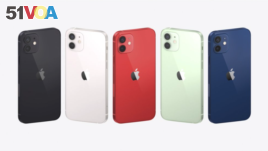14 October 2020
Apple has announced its first smartphones built to work with 5G, the world's fastest ever wireless technology.
While the new phones may have been long awaited by Apple fans, many users will not experience the reality of 5G anytime soon. This is because 5G networks are still being built in many parts of the world, including wide areas of the United States.
Four new models
At a virtual release event on Tuesday, the company announced four versions of its latest device, the iPhone 12. The base model has the same display size as the iPhone 11 – 15.5 centimeters - but the new iPhone 12 is lighter and thinner. It sells for $800.
A much smaller version, called iPhone 12 Mini, has a 13.7 cm display. It is priced at $700. The company describes the Mini as "the world's smallest, thinnest, lightest 5G phone."

This image provided by Apple shows a display of the new iPhones equipped with technology for use with faster new 5G wireless networks that Apple unveiled Tuesday, Oct. 13, 2020. (Apple via AP)
The other two devices – the iPhone 12 Pro and iPhone 12 Pro Max – are aimed at users seeking Apple's highest end smartphones. The iPhone 12 Pro Max is the largest of the new devices, with a 17 cm display. The Pro version comes with a 15.5 cm display. The iPhone 12 Pro sells for $1,000, while the Pro Max costs an additional $100.
Apple says the Pro and Pro Max versions offer a more powerful three-camera system and improved photo processing tools to produce higher quality pictures and video.
The two devices also come equipped with a new three-dimensional, or 3D "LiDAR" sensor system. LiDAR is a technology that uses light lasers to scan areas and measure distances. Apple said users will be able to use the tool to create "depth maps" of whatever space they are in. LiDAR can also improve camera operations in low light situations and at night.
Pre-orders will begin October 16 for the iPhone 12 and iPhone 12 Pro in the United States, Britain, China and some other countries. The iPhone Mini and Pro Max will be available for pre-order on November 6 and will arrive in stores November 13.
5G technology
The company said all its iPhone 12 models in the United States will support "millimeter wave" 5G, the fastest version of the technology, as well as mid and low band signals. Some competing Android devices support only the lower band versions of 5G.
Apple brought in the head of U.S. wireless carrier Verizon, Hans Vestberg, to explain the strength of 5G on its network. 5G promises much faster speeds for things like downloading movies and gaming on mobile devices. 5G is also expected to prevent internet slowdowns in high use areas.
But connecting at such speeds currently can be rare. While major telecom operators have launched 5G networks, major speed improvements are still uncommon in much of the world. Some parts of Asia – notably China and South Korea – have established 5G networks that offer users major speed improvements.
Bob O'Donnell is head of TECHnalysis Research, a technology market research company. He told the Reuters news agency he thinks Apple may be setting users up for disappointment by drawing too much attention to the benefits of 5G.
Many users receiving their new 5G iPhones will only be able to experience small speed increases until wireless carriers fully build out their network systems, O'Donnell said. "I don't feel like Apple clarified that as much as they could have."
Still, many industry experts expect the new 5G devices to sell well since Apple has one of the world's most loyal and wealthy user bases. The iPhone remains at the center of Apple's business.
Competitors making Android devices – such as South Korea's Samsung and China's Huawei – began launching their 5G smartphones more than a year ago.
HomePod
During its launch event, Apple also announced it was shrinking the size and price of its HomePod smart speaker. The new HomePod Mini – which is based on Apple's Siri assistant technology - will cost $100 and start shipping on November 16.
The smart speaker launch is seen as a move by Apple to catch up to Amazon and Google in the market for internet-connected home devices. Apple still holds only a small share of the market.
Experts say a big reason for Apple's low sales of its smart speaker is that its main HomePod device costs $300, while competing products from Amazon and Google cost as little as $50.
I'm Bryan Lynn.
Bryan Lynn wrote this story for VOA Learning English, based on reports from The Associated Press, Reuters, Agence France-Presse and Apple. Hai Do was the editor.
We want to hear from you. Write to us in the Comments section, and visit 51VOA.COM.
________________________________________________________________
Words in This Story
virtual – adj. using computer and internet technology to conduct activities normally carried out in person
display – n. a computer or device screen that shows electronic information
three-dimensional - adj. appearing to have length, depth and width
scan – v. the act of scanning, or looking at all or part of something
disappointment – n. feeling unhappy about something that did not turn out as good as expected
benefit – n. a good or helpful result or effect
clarify – v. make something easier to understand by explaining it